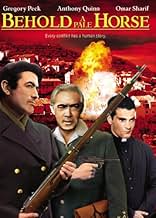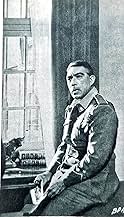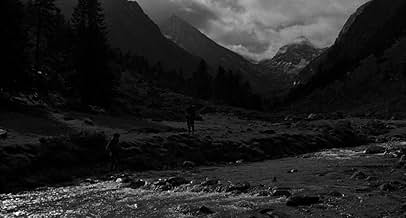CALIFICACIÓN DE IMDb
6.7/10
2.4 k
TU CALIFICACIÓN
El famoso bandido español Artiguez regresa a su pueblo natal español después de 20 años en el exilio francés, pero el policía español Vinolas le tiende una trampa.El famoso bandido español Artiguez regresa a su pueblo natal español después de 20 años en el exilio francés, pero el policía español Vinolas le tiende una trampa.El famoso bandido español Artiguez regresa a su pueblo natal español después de 20 años en el exilio francés, pero el policía español Vinolas le tiende una trampa.
- Dirección
- Guionistas
- Elenco
Marietto
- Paco Dages
- (as Marietto Angeletti)
Perrette Pradier
- Maria, Hussy
- (as Perette Pradier)
- Dirección
- Guionistas
- Todo el elenco y el equipo
- Producción, taquilla y más en IMDbPro
Opiniones destacadas
When the Spanish War was finished, winners devoted to go after anybody who reflected the red light of the communism or any other color they dislike. On the other hand, few guerilla fighter continued his actions against the winners. But their strength was lower every time. One of this guerrilla was Valentin González "el campesino", which figure is portrayed in this film in a free form (not in an historical form).
Twenty years after the Civil war conclusion, the Spanish police has a good option to capture one of these ex-combatants, who was in exile in France. The description of the methods and day-to-day life of the Spanish police could be the reason which explains that the Spanish Government forbade any more Columbia's film in Spain.
You need no knowledge about the twenty Century Spain's history to understand the film, although you can enjoy more it if you know something. In fact, the film put in a specific political situation the psychological confrontation between two men. It could be a good exercise to understand the motives which impulse his actions.
Twenty years after the Civil war conclusion, the Spanish police has a good option to capture one of these ex-combatants, who was in exile in France. The description of the methods and day-to-day life of the Spanish police could be the reason which explains that the Spanish Government forbade any more Columbia's film in Spain.
You need no knowledge about the twenty Century Spain's history to understand the film, although you can enjoy more it if you know something. In fact, the film put in a specific political situation the psychological confrontation between two men. It could be a good exercise to understand the motives which impulse his actions.
Intelligent and magnificent film by the great director Fred Zinnemann . It deals with "Manuel Artíguez" (Gregory Peck), he is a popular "maqui" or partisan who after the Spanish Civil War, left the country such as hundreds of comrades to take refuge in France. Twenty years later, "Paco" , a 11 years kid , and son of his best friend passes the Spanish border to ask him for return to Spain and murder the Captain of the Civil Guard, "Viñolas" (Anthony Quinn), in revenge for the death of his father. Artíguez, a resident in the city of Pau is nowadays retired and ignores the request of the boy . But, "Pilar" (Mildred Dunnock) mother of "Artíguez" falls seriously ill, and "Viñolas" decides to prepare a trap that allows capture "Artíguez" . Although a good priest (Omar Sharif) advises Manuel that he's being double-crossed by Carlos (Raymond Pellegrin), Manuel determines to return at whatever cost.
Picture inspired by the novel "Killing a mouse on Sunday" by Emeric Pressbuguer in which the personages undergo a physical wage war and ideological battle in post-Spanish Civil War . At the beginning displays frames of the documentary "Morir en Madrid," with opening montage by courtesy by Frederic Rossif. The film was shot in Franstudio, Saint-Maurice, Val-de-Marne, France and Lourdes, Hautes-Pyrénées, France . There was built a Spanish street that followed once time was terminated the shooting . Pressburger's novel was loosely based on the last raid of real-life anarchist guerrilla Antonio Sabate who was murdered in an ambush in 1959.
This film is almost unknown since it was banned in Spain for its politics issues until subsequent exhibition in 1979. The movie was prohibited in Spain, which was still commanded by Generalissimo Francisco Franco (deceased in 1975), the victorious General of the Spanish Civil War . And it was scheduled to be telecast on a major American network, but was canceled at the last minute, allegedly at the behest of the Spanish government. Fortunately today we can enjoy this splendid masterpiece , a motion picture masterfully realized and played with a top-notch list of first players . The performers hand perfectly their respective characters . The "Manuel" role in his bitterness and deception is awesome , as well as the "Viñolas" in his toughness and rudeness . Furthermore , a large secondary cast formed by veterans as Mildred Dunnock and Paolo Stoppa ; and brief roles by Daniela Rocca ,Jose Luis Villalonga, Claude Berri , Michael Lonsdale, Christian Marquand and Rosalie Crutchley as the ill wife.
This is an interesting and thought-provoking thriller well produced by Alexander Trauner ( also production designer) and Zinnemann . It packs tension , high intrigue , political events and is slow-moving ; however is pretty entertaining . In spite of the fact that the runtime is overlong, is neither tiring , nor dull , but thrilling . The motion picture is stunningly directed by Fred Zinnemann who had a lot of experience from his former classic films as ¨High Noon, From here to eternity, Man for all seasons ¨, among them. Rating : Very Good , better than average. In spite of being such fine movie the picture had a minor success at the box office . Rating : Above average . Essential and indispensable watching , valiant try by all.
Picture inspired by the novel "Killing a mouse on Sunday" by Emeric Pressbuguer in which the personages undergo a physical wage war and ideological battle in post-Spanish Civil War . At the beginning displays frames of the documentary "Morir en Madrid," with opening montage by courtesy by Frederic Rossif. The film was shot in Franstudio, Saint-Maurice, Val-de-Marne, France and Lourdes, Hautes-Pyrénées, France . There was built a Spanish street that followed once time was terminated the shooting . Pressburger's novel was loosely based on the last raid of real-life anarchist guerrilla Antonio Sabate who was murdered in an ambush in 1959.
This film is almost unknown since it was banned in Spain for its politics issues until subsequent exhibition in 1979. The movie was prohibited in Spain, which was still commanded by Generalissimo Francisco Franco (deceased in 1975), the victorious General of the Spanish Civil War . And it was scheduled to be telecast on a major American network, but was canceled at the last minute, allegedly at the behest of the Spanish government. Fortunately today we can enjoy this splendid masterpiece , a motion picture masterfully realized and played with a top-notch list of first players . The performers hand perfectly their respective characters . The "Manuel" role in his bitterness and deception is awesome , as well as the "Viñolas" in his toughness and rudeness . Furthermore , a large secondary cast formed by veterans as Mildred Dunnock and Paolo Stoppa ; and brief roles by Daniela Rocca ,Jose Luis Villalonga, Claude Berri , Michael Lonsdale, Christian Marquand and Rosalie Crutchley as the ill wife.
This is an interesting and thought-provoking thriller well produced by Alexander Trauner ( also production designer) and Zinnemann . It packs tension , high intrigue , political events and is slow-moving ; however is pretty entertaining . In spite of the fact that the runtime is overlong, is neither tiring , nor dull , but thrilling . The motion picture is stunningly directed by Fred Zinnemann who had a lot of experience from his former classic films as ¨High Noon, From here to eternity, Man for all seasons ¨, among them. Rating : Very Good , better than average. In spite of being such fine movie the picture had a minor success at the box office . Rating : Above average . Essential and indispensable watching , valiant try by all.
I had been looking forward to this one for some time, due to its rather imposing credentials; it's certainly well-made and acted but also heavy-going, slow and excessively talky.
Gregory Peck is even stiffer and glummer than usual as a washed-out guerrilla fighter; Anthony Quinn is generally more subdued than is customary for him, being effectively cast against type as Peck's nemesis (though his character is completely absent from the film's mid-section); after a belated entrance, Omar Sharif manages to steal the acting honors from under the nose of his more experienced companions by giving a moving portrayal of a conflicted priest. The excellent cast is rounded out by Paolo Stoppa, Christian Marquand, Daniela Rocca, Mildred Dunnock, Rosalie Crutchley and Michel Lonsdale.
Ultimately, the film lacks the touch of greatness but the unusual subject matter (adapted from an Emeric Pressburger novel) and the surprising but affecting child's eye view it takes of events keep one watching. Furthermore, the climactic assault on the hospital is both suspenseful and exciting and the ever-reliable Maurice Jarre contributes a subtly effective score.
Gregory Peck is even stiffer and glummer than usual as a washed-out guerrilla fighter; Anthony Quinn is generally more subdued than is customary for him, being effectively cast against type as Peck's nemesis (though his character is completely absent from the film's mid-section); after a belated entrance, Omar Sharif manages to steal the acting honors from under the nose of his more experienced companions by giving a moving portrayal of a conflicted priest. The excellent cast is rounded out by Paolo Stoppa, Christian Marquand, Daniela Rocca, Mildred Dunnock, Rosalie Crutchley and Michel Lonsdale.
Ultimately, the film lacks the touch of greatness but the unusual subject matter (adapted from an Emeric Pressburger novel) and the surprising but affecting child's eye view it takes of events keep one watching. Furthermore, the climactic assault on the hospital is both suspenseful and exciting and the ever-reliable Maurice Jarre contributes a subtly effective score.
This is a film which has almost faded into total obscurity, and that's tragic, because it's well worth seeing. It's sort of a thinking person's suspense movie, better appreciated if you know some details about the intricate historical background in which it is set. Even so, it can be appreciated for its dramatic settings and characterizations. It has a complicated plot, to be sure, but the story rolls right along...not a lot of action until the end, but the tension builds steadily. I'm no fan of Peck, but his role here really drew me in. He looks beaten down by a hard life and way too much unhealthy passion. Quinn doesn't have much screen time, but I liked some of the minor characters best...their faces were great. The credit sequence, meshed together perfectly with newsreels, shows a long line of defeated soldiers, their faces reflecting defeat and confusion... a great tracking scene.
Here are some reasons I think the film is unknown: 1. The main character is an atheist communist anti-catholic guerilla bandit. Not a popular icon in American movies. 2. Complex historical background. 3. Knowledge of political situation in Spain a minimum requirement. Not a priority on many American's lists. 4. Black and white photography in 1964. (Hey, I liked the scenery...but you always wonder how it would look in color...and this was a late date for a black and white feature film.) 5. Civil War movies (even Spain's) always run a risk...you might alienate half the audience.
Here are some reasons I think the film is unknown: 1. The main character is an atheist communist anti-catholic guerilla bandit. Not a popular icon in American movies. 2. Complex historical background. 3. Knowledge of political situation in Spain a minimum requirement. Not a priority on many American's lists. 4. Black and white photography in 1964. (Hey, I liked the scenery...but you always wonder how it would look in color...and this was a late date for a black and white feature film.) 5. Civil War movies (even Spain's) always run a risk...you might alienate half the audience.
8wilp
I saw this film years ago and it made a deep impression (even if my interest in the Spanish War does bias me in its favour); it's on my short list of works to locate and see again. Its treatment of generations and of legacies is as relevant as ever, now that the number of people living who witnessed that upheaval is shrinking fast. The film will move boys (who can identify with one of the main characters) and will not deprave them with violence, the little violence (if I remember correctly) being more suggestive than explicit. A psychological film with some intensely aesthetic moments.
¿Sabías que…?
- TriviaThe movie was banned in Spain, which was still ruled by Generalisimo Francisco Franco, the fascist victor of the Spanish Civil War.
- ErroresIn the first 5 minutes of the movie it is supposed to be 1939 and the Loyalist (Republican) soldiers are crossing into exile on the French border. As they cross over they are turning in their guns and the first one to turn in his gun turns in a Soviet PPSh-41 sub-machine gun. The PPSh-41 was not developed until 1941.
- Créditos curiososOpening credits - the first card shown contains the passage from Revelations 6:8, which contains the phrase "Behold a Pale Horse", the title of the film.
- ConexionesFeatured in Hollywood contra Franco (2008)
Selecciones populares
Inicia sesión para calificar y agrega a la lista de videos para obtener recomendaciones personalizadas
- How long is Behold a Pale Horse?Con tecnología de Alexa
Detalles
Taquilla
- Presupuesto
- USD 3,900,000 (estimado)
- Tiempo de ejecución2 horas 1 minuto
- Color
- Mezcla de sonido
- Relación de aspecto
- 1.85 : 1
Contribuir a esta página
Sugiere una edición o agrega el contenido que falta

Principales brechas de datos
By what name was La sangre llama (1964) officially released in India in English?
Responda



































